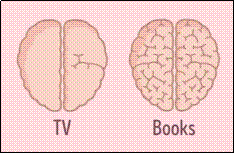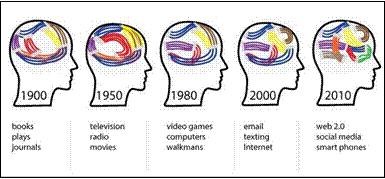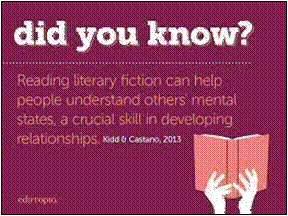Why should I read a book?
Mrs.Janani Sunderarajan Mother of Arvind & Ananya Sunderarjan
Mom : Please switch off the television, Anya. Its reading time now.
Anya : Mama, 2 minutes please.
{After 2 minutes}
Mom : Anya, your 2 minutes are up. Switch off the TV.
Anya :2 more minutes, the program is almost over…
{After 2 minutes}
Mom : Anya, Switch off the TV.
Anya : Mama, please….
Mom : {Raising her voice} SWITCH OFF THE TV NOW. Pick up a book and READ. [Mother snatching the remote control and switching off the TV]
Mom : When we were your age, we used to read so many books and not waste time in front of the TV. TV is not good for your health.
Anya : [Frustrated] When I can get the same knowledge and experience from watching an episode on TV, WHY SHOULD I READ?
A very familiar scene from our daily routine? Do we have an answer to this very pertinent question of why books over TV? Well, I didn’t! I dug a little deeper to understand this issue. Is this an issue of generation gap or is there a real reason behind the theory that reading is better than screen time?
Let me list out the top four reasons as to why reading wins hands down over television or any screen for that matter.
Reading makes the brain more active
If I could insert a camera into my brain while I watch TV and while I read, the image would look like this:

[Courtesy: https://brightside.me/wonder-curiosities/9-amazing-examples-of-how-we-influence-our-brains-362210/ ]
Research shows that a number of brain functions act in union while reading including visual and auditory processes, language comprehension, decoding and discriminating processes and more. In addition to this, a number of brain connections – white matter pathways – are established.
The brain makes a lot of criss-cross connections, say like a motherboard with a lot of wires - More the wiring, sharper is our brain!
Increases attention span
Reading is known to improve memory. The structure of any book with a sequential flow holds the reader’s attention.
As the following image shows the shift in media from books to television, and then to video games, Internet, social media, and smart phones, has slowly rewired our brains. We have shorter attention spans. We prefer short texts.

[Courtesy: https://idratherbewriting.com/2011/01/21/contemporary-reading-behaviors-favor-short-formats/ ]
In television programs, the content is generally very fast paced – images changing every few seconds – so as to keep the viewers engrossed. This overstimulation may tax parts of the brain which may have short or long-term repercussions. According to a study from Children’s Hospital and Regional Medical Center in Seattle published in the April issue of PEDIATRICS, each hour of television watched per day at ages 1-3 increases the risk of attention problems, such as ADHD, by almost 10 percent by age 7.
In this “super-fast paced†times that we are in, virtues like patience, tolerance, delayed gratification, is becoming a rarity. In fact, these qualities are being actively condescended upon, defining them as weaknesses. But in the project called “lifeâ€, it is these qualities which are going to keep us in good stead.
Increases emotional quotient

I am sure we all have “felt†a lot of emotions while reading a book. We have cried with certain books and laughed out aloud with a few others. Well, there is scientific evidence for this behaviour. When we read, neurons in the area of the brain get activated to create a sensation of not only reading the book but also experiencing the sensations it is describing.
One of the problems of watching television is that it reduces Theory of Mind (ToM). Wikipedia defines ToM as, Theory of mind (often abbreviated "ToM") is the ability to attribute mental states— beliefs, intents, desires, pretending, knowledge, etc.—to oneself and others and to understand that others have beliefs, desires, and intentions that are different from one's own. This is an important socio- cognitive skill which will help us in interacting with the outside world and ourselves.
Prevents Alzheimer’s disease and Dementia
We have all heard of the Alzheimer’s disease which mostly affects at old age. Research proves that mental abnormalities likes Alzheimer’s disease and dementia can be prevented with life- long reading and especially into old age. As we have already seen in the previous three sections, we use many parts of the brain – cognitive, memory and the empathetic areas – while reading. This keeps the brain very healthy and active preventing brain abnormalities.
I will leave you with this thought:
One large-scale study conducted over 20 years found that people who grow up in a house that has books are more likely to achieve higher education, something that is related to higher income and better cognitive function later in life.
References:
- https://brightside.me/wonder-curiosities/9-amazing-examples-of-how-we-influence-our- brains-362210/
- https://www.bustle.com/p/what-does-reading-do-to-your-brain-these-5-effects-are-pretty-astounding-74676
- https://www.psychologytoday.com/us/blog/metacognition-and-the-mind/201804/can-reading-help-my-brain-grow-and-prevent-dementia
- Evans, M. D., Kelley, J., Sikora, J., & Treiman, D. J. (2010). Family scholarly culture and educational success: Books and schooling in 27 nations. Research in Social Stratification and Mobility, 28, 171–197.
Disclaimer:
The views, thought sand opinions expressed in this article belongs solely
to the author.



